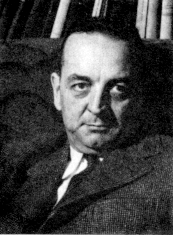| Profile | Major Works | Resources |
Henry Calvert Simons, 1889-1946

A student of Frank H. Knight, Henry C. Simons represents, to many, the early days of "Monetarism" at Chicago - and thus the true progenitor of what is commonly considered the Chicago School.
Unlike Knight, Simons had no qualms about the desirability of a capitalist free-market system and was outspoken in his defense (and recommendation) of laissez-faire as policy. An avid opponent of New Deal policies, his pleas for their reversal in both the popular press and the journals of the University of Chicago, were compounded with a call for the government to instead merely set the framework for the working of a free market economy and to then withdraw. He did recommend the government pursue Anti-Trust policy vigorously - against both firms and labor unions - as well as setting out the now famous Monetarist creed of strict control and provision of a stable supply of money according to a non-discretionary (albeit counter-cyclical) "rule" -- what was known as the "Chicago Plan". Thus, he called during that time for active monetary expansion via deficit spending.
Other than this, Simons contributed little to economics other than setting out some proposals on tax reform, many of which have since been implemented. Henry Simons's role was perhaps more as a teacher of the generation that was to stress more on the distinctive character of the "Chicago School", particularly his appointment to the Chicago Law School was to become characteristic of the later law-economic nexus of Chicago. Naturally, Simons was acknowledged by Milton Friedman as one main teachers and influences.
|
Major works of Henry C. Simons
|
HET
|
|
Resources on H.C. Simons
|
All rights reserved, Gonšalo L. Fonseca
